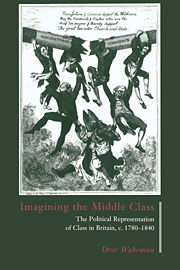Book contents
- Frontmatter
- Contents
- List of figures
- Acknowledgments
- 1 Imagining the ‘middle class’: an introduction
- PART I AGAINST THE TIDE
- PART II THE TUG OF WAR
- PART III WITH THE TIDE
- 7 The social construction of the ‘middle class’
- 8 The parallels across the Channel: a French aside
- 9 The debates on the Reform Bill: bowing to a new representation of the ‘middle class’
- 10 Inventing the ever-rising ‘middle class’: the aftermath of 1832
- 11 1832 and the ‘middle-class’ conquest of the ‘private sphere’
- Epilogue
- Index
11 - 1832 and the ‘middle-class’ conquest of the ‘private sphere’
Published online by Cambridge University Press: 08 January 2010
- Frontmatter
- Contents
- List of figures
- Acknowledgments
- 1 Imagining the ‘middle class’: an introduction
- PART I AGAINST THE TIDE
- PART II THE TUG OF WAR
- PART III WITH THE TIDE
- 7 The social construction of the ‘middle class’
- 8 The parallels across the Channel: a French aside
- 9 The debates on the Reform Bill: bowing to a new representation of the ‘middle class’
- 10 Inventing the ever-rising ‘middle class’: the aftermath of 1832
- 11 1832 and the ‘middle-class’ conquest of the ‘private sphere’
- Epilogue
- Index
Summary
Our fashion may indeed be considered the aggregate of the opinions of our women … The domestic class of women … [is virtuous] in the very refraining from an attempt to influence public opinion.
(Edward Bulwer-Lytton, 1831)The middle classes interest themselves in grave matters: the aggregate of their sentiments is called OPINION. The great interest themselves in frivolities, and the aggregate of their sentiments is termed FASHION.
(Edward Bulwer-Lytton, 1833)Consider these two observations about fashion and opinion by the novelist Edward Bulwer-Lytton, penned two years apart. The affinities between them are manifest. So are the differences. The first was included in a comparison of ‘the spirit of society’ in England and France in 1831, a comparison that was dominated throughout by the fundamental dichotomy of ‘public’ and ‘private’, delineated as that between men and women. ‘The proper sphere of woman’, Bulwer-Lytton then stated further, ‘is private life, and the proper limit to her virtues, the private affections’; in contrast with ‘public opinion’, that exclusive masculine realm that should remain free of ‘feminine influence’.
But by 1833 Bulwer-Lytton's understanding of the antithesis between fashion and opinion had revealingly changed, replacing a polarity of gender with a polarity of class. He no longer designated ‘fashion’ as the aggregate of the opinions of women, but instead as the aggregate of the opinions of the upper classes; and ‘public opinion’ was no longer the domain of men, but instead the aggregate of the opinions of the ‘middle class.’
Information
- Type
- Chapter
- Information
- Imagining the Middle ClassThe Political Representation of Class in Britain, c.1780–1840, pp. 377 - 408Publisher: Cambridge University PressPrint publication year: 1995
